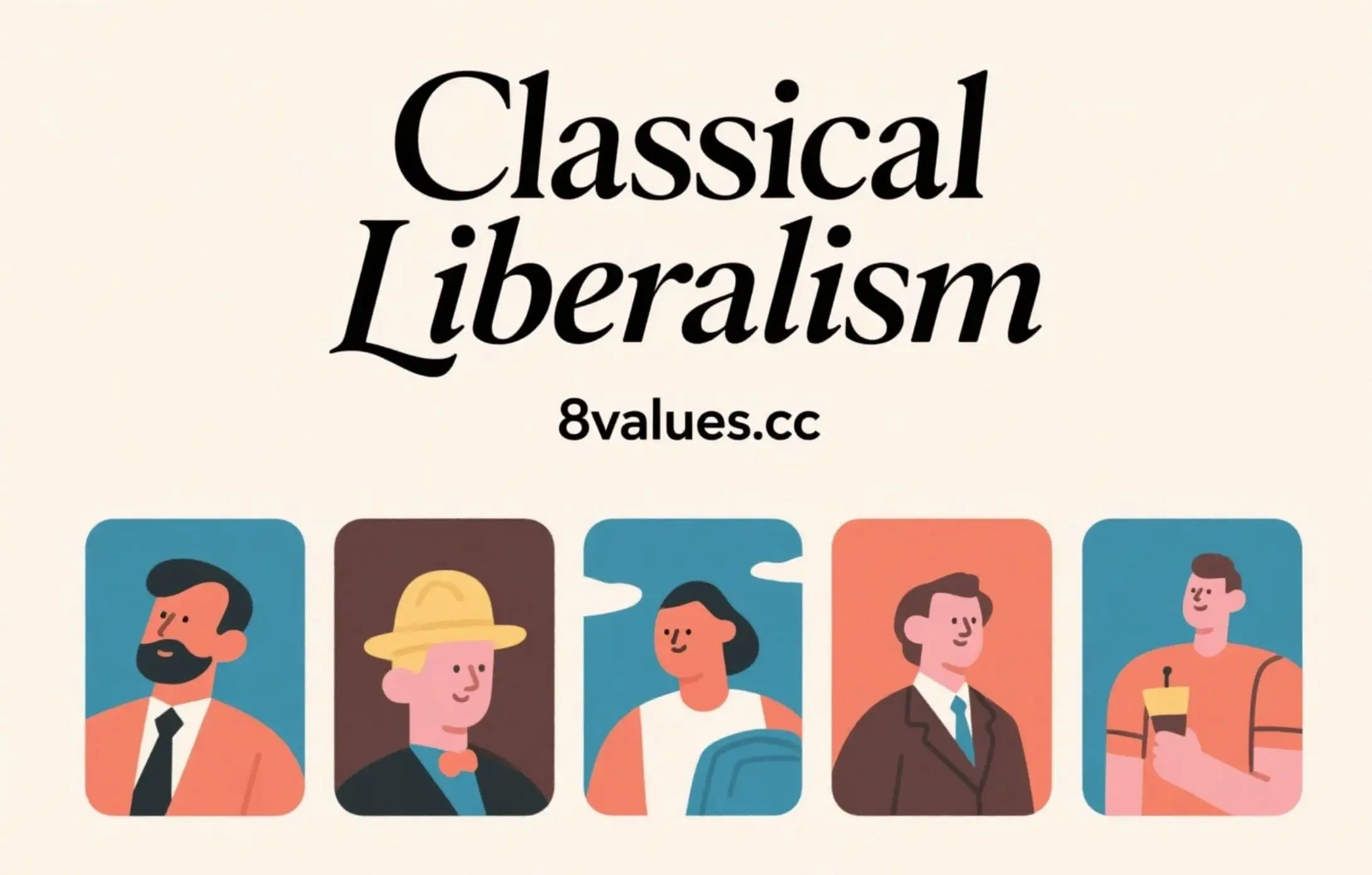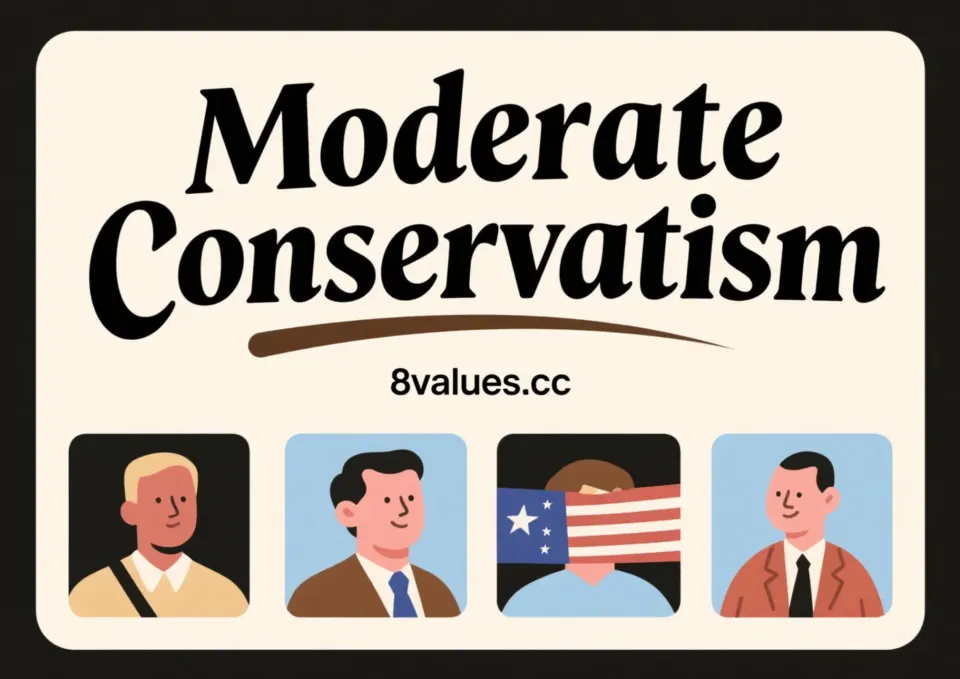8 Values Interpretation of Psychology of Political Values
Deeply analyze the psychological principles and logic behind the 8Values political value test, understand the significance of the eight major political value dimensions such as economy, diplomacy, fairness, and freedom, and help you explore your personal political tendencies and psychological traits.
In the interdisciplinary study of psychology and politics, Values Test has gradually become a tool that attracts attention. One of the most popular is the 8Values test. Through psychological assessment, it transforms abstract political ideology into quantifiable value coordinates, providing us with an intuitive reference for understanding the political psychology of individuals and groups.
How to test it? First go to the 8values test official website entrance to complete the 70-question value evaluation, and then come back to compare this article for in-depth interpretation. If you have finished the test, you can use political spectrum analysis to view your points and four quadrant distribution.
What are 8Values?
8Values is the abbreviation of the 8values political test. The 8values test maps your answers to four main axes and eight values through a series of statement questions, forming personalized political coordinates, and evaluating your political stance and tendencies. The test method is similar to the political compass, but it is closer to the value orientation in terms of dimension naming and result presentation.
How to test it? Enter the 8Values test official website address and click "Start Test" to enter the answer page. By completing 70 multiple-choice questions, you will receive a detailed interpretation of your ideological and political tendencies.
Want to see 8values all results categories with ideological entries? See 8values Ideological Overview .
8Values Basic Framework for Testing
The core idea of 8Values is: political belief is not just an opposition between the left and the right, but a combination of multidimensional values . 8values The political test passes 70+ declarative questions, allowing users to choose on a continuous spectrum of "agree-opposition", thereby measuring the following eight value dimensions:
- Equality vs. Markets
- Inclines to equality and emphasizes public resources and welfare
- Positive to market, emphasizing free competition and private property
- Psychological Mapping: Altruism vs. Achievement/Power Motivation.
- Diplomacy (Nation vs. Globe)
- Inclines to nationalism, emphasizing national sovereignty and borders
- Inclined to globalism and support transnational cooperation and openness
- Psychological Mapping: Intragroup Identity vs. Universalism/Openness.
- Citizen (Liberty vs. Authority)
- Freedom-oriented, supporting individual rights and self-determination
- Authoritative orientation, emphasizing order, tradition and national authority
- Psychological Mapping: Self-oriented vs. Adherence/Safety Needs.
- Society (Progress vs. Tradition)
- Inclined to progress, attach importance to social reform and cultural renewal
- Inclines to tradition, emphasizing continuity and conservatism of social values
- Psychological Mapping: Open Change vs. Conservatism.
Each axis is further subdivided into two value points, forming a total of 8 value tags, so it is called 8Values .
Value Measurement from a Psychological Perspective
In psychological research, differences in individual values are often closely related to personality traits, social experience and cultural background. 8Values essentially have a certain correspondence with Schwartz Value Theory - that is, values can be mapped into a set of interrelated but tensioned psychological dimensions.
- Economic dimension : corresponding to the conflict of values of "altruism vs. achievement/power"
- Diplomatic dimension : corresponding to "universalism vs. tradition/national identity"
- Citizen Dimension : Corresponding to "self-oriented vs. conformity/security"
- Social dimension : corresponding to "open change vs. conservative"
From a psychological perspective, the individual's choice in these tests not only reflects their value preferences, but also reflects social identity, risk perception, desire to control and cognitive style .
8Values comparison with MBTI and Big Five
Many people confuse 8Values with psychological tools such as MBTI and Big Five. But essentially, they measure different dimensions:
- MBTI/Big Five Personality : More inclined to personality psychology, measuring individual's stable traits in thinking, emotions, social behavior, etc.
- 8Values : More inclined to political psychology, measuring individuals’ value positions on social issues
Nevertheless, the two can complement each other:
- People with high openness (high Big Five O value) are more likely to show a "progressive-globalist" tendency in the 8Values test.
- People with high conscientiousness are more likely to be "traditional-authoritative".
The application significance of social psychology
The popularity of 8Values illustrates the fact that people need simplified, visual ways to understand complex political identities . In social psychology research, it has the following value:
- Group comparison Can be used for research on value differences across cultures and groups.
- Political polarization research Help understand the psychological roots of social division and political antagonism.
- Education and self-cognition Young people can use tests to explore their political orientation and enhance their civic awareness.
- Public opinion analysis In the big data environment, similar models can be used to understand the value trend of online public opinion.
Criticism and limitations
- Oversimplification : Complex political ideas are compressed into four axes, making it difficult to cover all reality.
- Cultural bias : Test design originates from the Western political context and may not be completely applicable to Eastern society.
- Self-presentation bias : The answerer may answer out of social expectations or self-image management.
in conclusion
8Values is not a psychological diagnostic tool in the strict sense, but a visual model of political psychology . Its value lies in helping people reflect on their own political identity and value stance through the form of "psychological assessment". As psychologists say: "Values are the psychological bridge between individuals and society." 8Values makes this bridge quantifiable and comparable, and therefore gains widespread attention in young groups and academic research.
👉 If you are interested, you can try the 8Values political tendency test to see where you are in the political psychology coordinate system.






